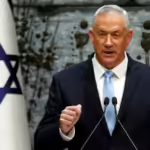Israel has imposed a second nationwide lockdown on Friday to tackle one of the world’s highest coronavirus infection rates, despite public protests over the new blow to the economy.
The three-week shutdown from 2:00 pm (1100 GMT) started just hours before Rosh Hashana, the Jewish new year, and will extend through other key religious holidays, including Yom Kippur and Sukkot.
Prime Minister Benjamin Netanyahu said the government had been left with no choice but to impose a lockdown.
“The health system has raised the red flag… We did everything we could to strike a balance between the health needs and needs of the economy,” he said in a televised address on Thursday.
While the government was praised for its initial handling of the pandemic, implementing a strict lockdown in March, many Israelis have expressed frustration at the cabinet’s perceived mismanagement of the crisis in recent months.
“We do not close a country this way,” ran a headline in the top-selling daily Yediot Aharonot on Friday, which featured interviews with doctors, economists and teachers all opposed to the lockdown.
Erez Berenbaum, director of Assuta hospital in the coastal city of Ashdod, said the “lack of clarity in the instructions will lead to defiance among Israelis”.
On the eve of the lockdown, authorities were still deciding on the details, with a rule ordering residents to stay within 500 metres (yards) of their homes extended late on Thursday to one kilometre.
During the first lockdown, the limit was set at 100 metres.
There are numerous exceptions to the new distance rule, including people going out to buy medicine or food, as well as to attend a funeral or circumcision ceremony.
In Israel, coronavirus has killed 1,169 people out of a population of nine million. (AFP)

 Join Daily Trust WhatsApp Community For Quick Access To News and Happenings Around You.
Join Daily Trust WhatsApp Community For Quick Access To News and Happenings Around You.


